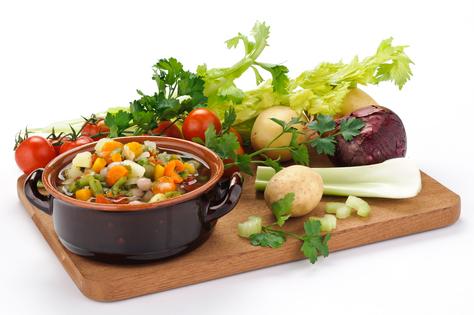Environmental Nutrition: Are raw vegetables healthier than cooked?
Published in Health & Fitness
How do you eat your vegetables? Raw? Cooked? Both? No matter what your answer, odds are good that you’ve heard that it’s “healthier” to eat your veggies raw. Maybe you’re even sold on the idea. But is it the truth?
It is true that cooking vegetables can reduce levels of some nutrients — but it also enhances levels of other nutrients. Nutrients most likely to be destroyed by cooking are those that are both soluble in water and sensitive to heat. This includes vitamin C, the B vitamins and glucosinolate, a phytochemical found in broccoli and other cruciferous veggies. When you boil vegetables, water-soluble nutrients are lost in the cooking water, but steaming, blanching, sautéing or roasting preserves them.
Some studies also show that levels of other antioxidant phytochemicals — carotenoids and lycopene in particular — are enhanced when vegetables are cooked. But don’t turn down those crunchy raw carrots on the crudité platter just because you would get more beta-carotene if those carrots were cooked. And just because you get more lycopene from stewed tomatoes or tomato paste than you do from raw tomatoes doesn’t mean you should deny yourself the summer pleasure of snacking on fresh cherry tomatoes.
Digestion and volume.
It’s also a myth that the “live enzymes” in raw vegetables helps you digest them. Humans have their own digestive enzymes, which do the job nicely. In fact, some people find that they digest cooked vegetables better, because the heat softens some of the tougher fiber (making the roughage less “rough”).
However, one advantage of eating vegetables raw is that they are still full of water, which means that you get more volume for fewer calories. This is great for providing balance to higher-calorie foods in a meal. On the other hand, because vegetables lose water content during cooking, you can eat more cooked veggies before feeling full, helping you pack in more nutrients. Dark leafy greens are a prime example of this — the amount of kale or spinach you might eat raw in a salad cooks down to almost nothing when you sauté it.
Storage wars
Keep in mind that many variables affect the precise dose of nutrients you’re receiving from your vegetables. For example, when fresh produce is shipped long distances and stored before being sold, it loses some nutrients from exposure to light, air, and fluctuating temperatures. It can lose even more if kept for too long in your refrigerator. For top nutrition and flavor, seasonal fresh produce grown locally, or at least regionally, is a best bet. Frozen produce is another nutrient-rich option because the freezing only slightly reduces levels of water-soluble vitamins, such as vitamin C and the B vitamins. The fact that it’s frozen almost immediately after harvest helps preserve other nutrients.
The bottom line
Eating lots of both raw and cooked vegetables is a key component of a nutritious and health-promoting diet. For best nutrition, eat a variety of vegetables prepared in ways you enjoy so you’ll want to eat them. Do you have a strong fondness for the juicy snap of raw vegetables, the crisp-tenderness of lightly blanched or steamed vegetables, or the sweet caramelization that comes from roasting? There’s nothing wrong with honoring this preference.
(Reprinted with permission from Environmental Nutrition, a monthly publication of Belvoir Media Group, LLC. 800-829-5384. www.EnvironmentalNutrition.com.)
©2025 Belvoir Media Group. Distributed by Tribune Content Agency, LLC.










Comments